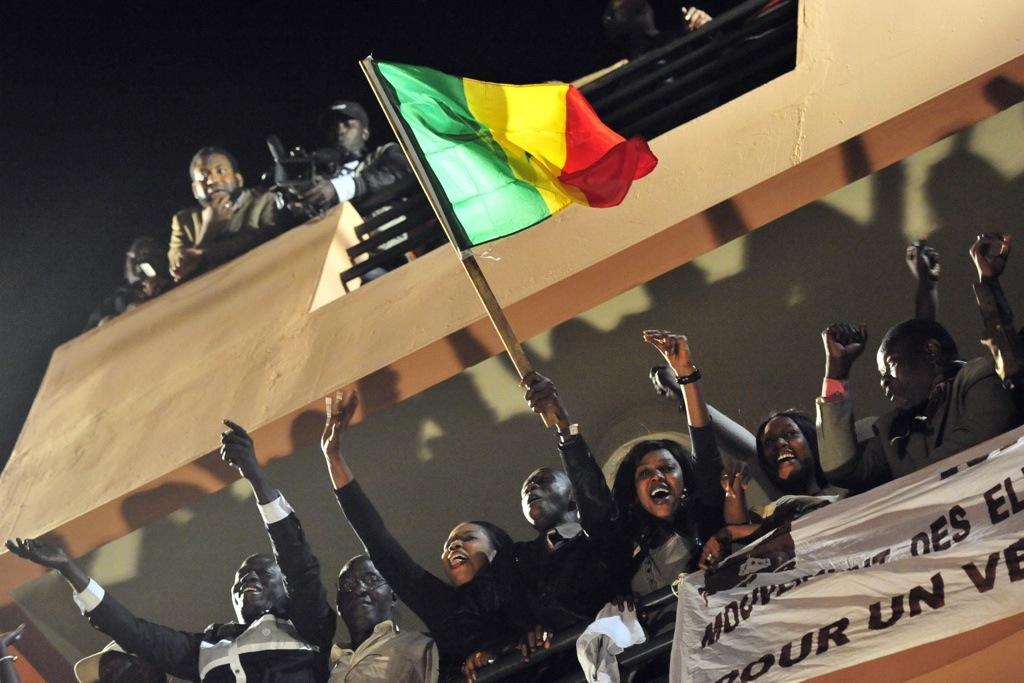Senegal: Democracy is the big election winner
Supporters of Senegalese opposition leader Macky Sall celebrate the news that President Abdoulaye Wade conceded defeat on March 25, 2012.
DAKAR, Senegal — Senegal's democracy was boosted by President Abdoulaye Wade's surprise acceptance of his election defeat to challenger Macky Sall.
"The big winner tonight is the Senegalese people,” said Sall at a midnight press conference Monday. “We have shown to the world our democracy is mature."
Senegal's is Africa's third oldest — and one of its most stable — democracies.
When he is inaugurated on April 2, Sall will become Senegal's fourth president since it gained independence from France in 1960. None came to power by violent means, something that cannot be claimed by many neighboring countries in West Africa, such as Ivory Coast, Liberia and Sierra Leone.
Last week Mali joined the list of countries disrupted by coups when disgruntled army officers overthrew the government, less than a month ahead of elections in which the incumbent was set to step down.
"I believe the people of Mali will take a cue from the result of this election and the way this election has gone, that a coup or military takeover is no longer fashionable in West Africa and, indeed, in Africa," said former Nigerian President Olusegun Obasanjo, head of the election observer mission from the Economic Community of West African States (ECOWAS).
For all the praise, the concerns about Wade's intransigence were not unfounded. He sought a controversial third term despite a constitutional limit of two that he had signed into law shortly after his first election in 2001. Rock-throwing demonstrators took to the streets to protest against Wade running for re-election. Police responded with teargas and rubber bullets. Six people died in those demonstrations.
More from GlobalPost: "Senegal wins" in presidential election, says Macky Sall
After the first round vote in February singled out Sall from the opposition field of 13, Wade's opponents decided to focus their efforts on unseating him by the ballot. The campaign for the second round was peaceful.
Even on election day allegations of vote-buying were widespread. The European Union electoral mission confirmed the phenomenon, perpetrated mostly by Wade’s Senegalese Democratic Party. But in the end, the effect was marginal.
While Senegal's democracy may be mature, its population is very young. More than 60 percent are under 25. Sall undoubtedly benefitted from the support of that demographic, which largely feels that the 85-year-old incumbent is out of touch with the rest of the country.
"We need a very young president, a dynamic president," said Alioune Mbaye, 23, who joined the thousands outside Macky Sall's headquarters on Sunday night. "Abdoulaye Wade wanted a third term, but he forced his way through. This is the result. The youth of Senegal stood up against him."
Compared to the octogenarian Wade, Sall, 50, is closer to the youth. But some analysts say that he will have a hard time fulfilling his campaign promises of reducing the price of staple goods and creating jobs for the youth who voted him into office.
More: Senegal's Abdoulaye Wade looks to marabouts for election help
"Sall has some major challenges on his hands to ensure that Senegal continues to enjoy the growth that it needs to cater to its growing young population," said Alex Vines of Chatham House, a London-based policy institute. "I can already see some overblown expectations about what he'll be able to deliver."
Sall has also promised to repair the damages done to Senegal's institutions by reinstating the checks and balances between the presidency, legislature and judiciary — which have become consolidated under Wade. Sall also plans to reduce the length of presidential terms from seven years to five.
That would mean that if he doesn't satisfy the powerful electorate, they will have another chance at change as early as 2017.
More from GlobalPost: Latin America’s hidden growth story
Editor's note: This piece was updated with the new inauguration date of April 2.
The story you just read is accessible and free to all because thousands of listeners and readers contribute to our nonprofit newsroom. We go deep to bring you the human-centered international reporting that you know you can trust. To do this work and to do it well, we rely on the support of our listeners. If you appreciated our coverage this year, if there was a story that made you pause or a song that moved you, would you consider making a gift to sustain our work through 2024 and beyond?
